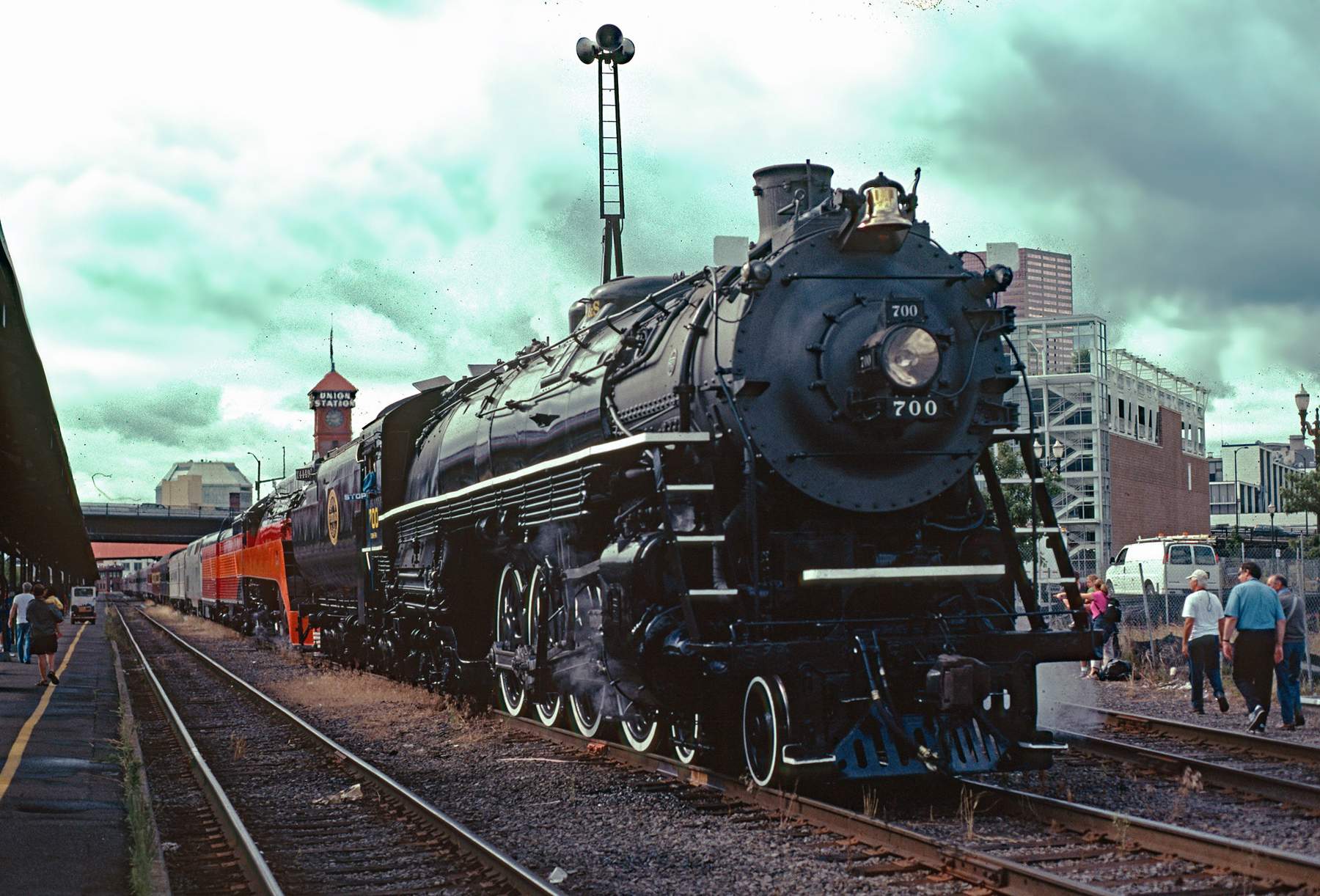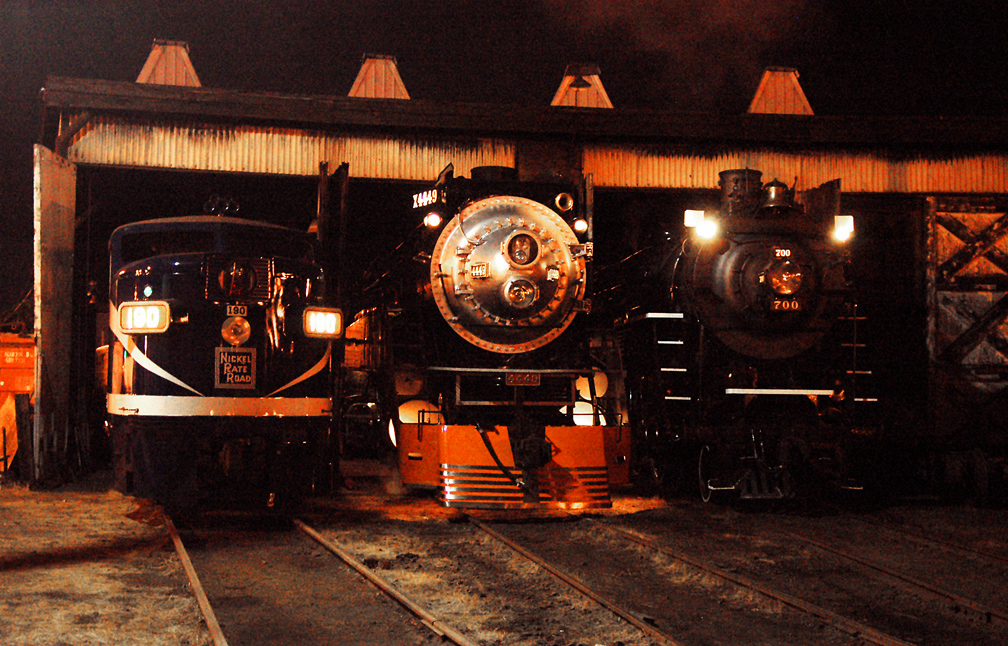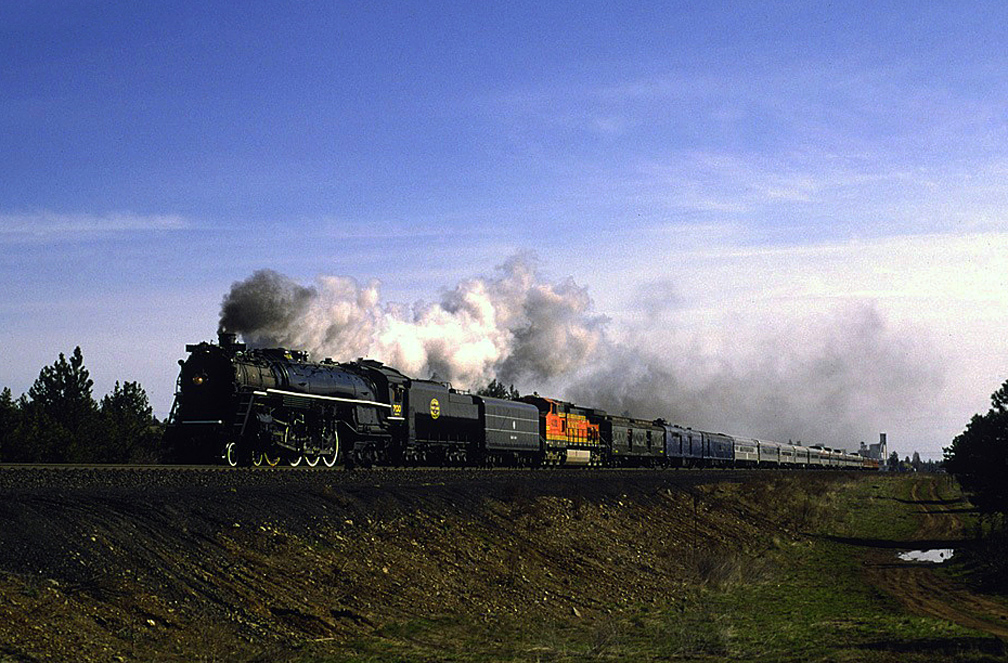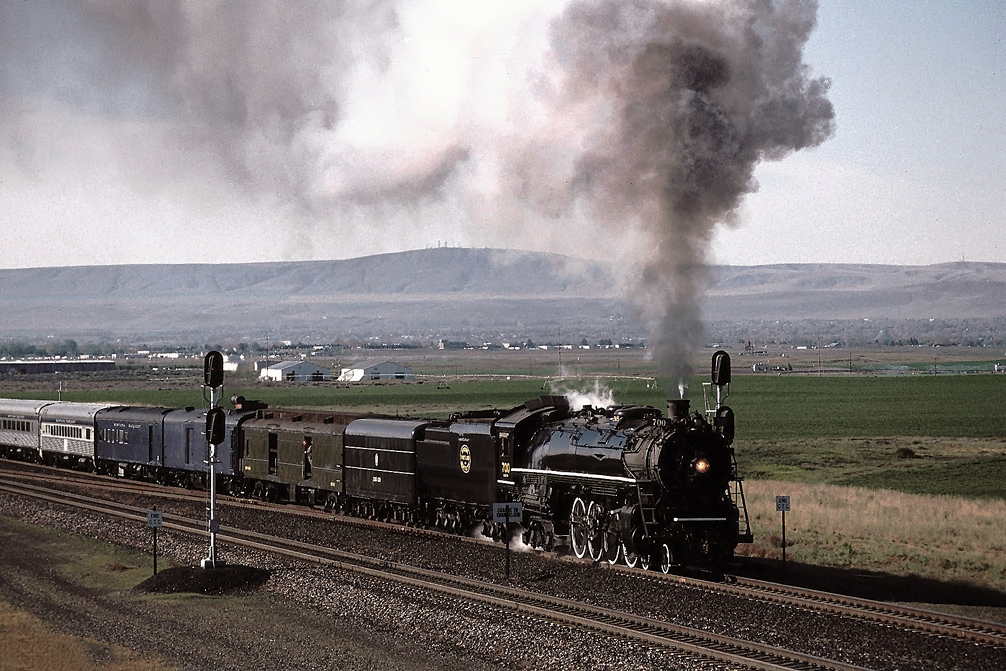SP&S 4-8-4 #700 Locomotive: Status, Specs, History
Last revised: August 25, 2024
By: Adam Burns
Spokane, Portland & Seattle #700 is a 4-8-4 steam locomotive manufactured for the railroad during the late 1930s. It spent less than 20 years in service on the SP&S, pulling crack passenger trains (as well some freights) before retirement and donation to the City of Portland.
It was one of two big steamers the city would acquire; in 1957 the municipality was also gifted Southern Pacific #4449 which sat on display outdoors at Oaks Park for 15 years before her restoration in the 1970's as part of the American Freedom Train. #700 may be the largest operational steamer that garners the least attention.
Beginning in the late 1970s thanks to hundreds of hours of work via volunteer labor the locomotive was returned to steam by the 1970's. However, since that time it has only been operated sparingly and hasn't been in the spotlight as often as stall-mate, #4449.
Today, #700 can usually be found on display at its new home inside the Oregon Rail Heritage Center at Portland where visitors can see the big locomotive up close.
 Folks inspect the big 4-8-4 at Portland Union Station (Oregon) on July 6, 2005. Drew Jacksich photo.
Folks inspect the big 4-8-4 at Portland Union Station (Oregon) on July 6, 2005. Drew Jacksich photo.The Spokane, Portland & Seattle Railway was jointly owned through the Northern Pacific and Great Northern giving both transcontinental systems access to Portland and other points in Oregon along a main line that followed the Columbia River much of the way west of Spokane.
However, for many years it operated with greatly underpowered locomotives since it was normally assigned secondhand equipment from the GN and NP.
That finally changed during the 1930s when it was realized this lack of adequate power was causing the SP&S to post slower transit times in comparison to the competing Union Pacific, which also served Portland via a route that followed the south bank of the Columbia.
Between 1937 and 1938 the SP&S took delivery of new freight and passenger locomotives, both of which were add-ons to orders already being placed by the Northern Pacific of the same designs.
In 1937 it acquired six massive 4-6-6-4 Challengers built by Alco, Classed Z-6 and numbered 900-905. Then, a year later it picked up three new 4-8-4s from the Baldwin Locomotive Works, given Class E-1 and numbered 700-702.
The three were virtually identical to a batch of Class A-3s purchased by the NP except that they were oil burners (using Bunker C fuel) and did not run on traditional coal.
The Northerns were also extremely handsome and graceful locomotives with a clean, almost streamlined-like appearance making them ideal to carry passenger trains.
 The "Three Musketeers"; from left to right Nickel Plate Road #190, Southern Pacific #4449, and SP&S #700 pose for photos during a night secession op at the Brooklyn Roundhouse during July of 2005. Drew Jacksich photo.
The "Three Musketeers"; from left to right Nickel Plate Road #190, Southern Pacific #4449, and SP&S #700 pose for photos during a night secession op at the Brooklyn Roundhouse during July of 2005. Drew Jacksich photo.Besides looking good the steamers offered more than enough power and were some of the most technologically advanced of their kind.
For instance, they boasted tractive efforts nearing 70,000 pounds and provided the highest axle loadings (more than 77,000 pounds) of any Northern put into service.
Additionally, they operated with the latest in steam technology such as roller bearings from the Timken Roller Bearing Company (which reduced maintenance and wear of the running gear) and a feedwater heater (this device heated water from the tender before transferring it into the boiler, an added efficiency).
During their years in service the Northerns (except #701, which normally pulled freights and only filled in on passenger consists when needed) powered notable trains such as the SP&S's own North Bank Limited along with the Builder, NCL, and other notable runs like the Columbia River Express and Oriental Limited (GN).
Spokane, Portland & Seattle's 4-8-4s
| Class | Road Numbers | Builder | Tractive Effort | Axle Loading | Boiler Pressure |
|---|---|---|---|---|---|
| E-1 | 700-702 | Baldwin | 69,756 | 77,200 | 260 PSI |
The three locomotives became affectionately known as "The Ladies" thanks in part to their graceful lines; #700 in particular was given special recognition as "The First Lady Of The Northwest" which was a nod to her status as the first on the trio to enter service.
After the Northern Pacific and Great Northern began streamlining their passenger trains during the mid-1940s, which included sleek diesels, it was inevitable that the still relatively new Northerns of the SP&S would also be seeing retirement in the near future.
While they were bumped from service on most flagship runs beginning with the arrival of E7A #750 in 1948 they continued pulling secondary trains like the GN's Western Star and NP's Mainstreeter.
 pokane, Portland & Seattle #700 leads a southbound excursion outside of Cheney, Washington as it heads for home in Portland on April 22, 2001. The author notes that lubrication issues necessitated the need for the BNSF helper. Drew Jacksich photo.
pokane, Portland & Seattle #700 leads a southbound excursion outside of Cheney, Washington as it heads for home in Portland on April 22, 2001. The author notes that lubrication issues necessitated the need for the BNSF helper. Drew Jacksich photo.This continued for a few years until diesels had completely replaced them from even these trains by 1953. Over the next few years the trio continued in freight service, for which they were also quite adept, until finally the SP&S retired all three in 1955.
As a final farewell, #700 was given one last assignment in 1956 to pull a special "Farewell To Steam" fantrip over the railroad that garnered so much interest that it required added cars from GN and NP to meet demand.
On May 26th the Northern pulled a 21-car train between Portland and Wishram, Washington carrying more than 1,300 passengers. In all likelihood this would have meant the end for #700 as the SP&S designated it to the scrap line.
However, when the railroad realized that the Union Pacific was donating Oregon Railroad & Navigation Company 4-6-2 #197 (then UP #3203) to Portland it too wanted to bestow such a gift and chose #700, which was transferred to the city in 1958.
This would be followed by Southern Pacific's donation of 4-8-4 #4449 and all three sat in Oaks Park on display until 1975 when #4449 was slated for restoration as part of the American Freedom Train.
Thanks in part to volunteers like Jack Holst and Chris McLarney #700 remained in relatively good condition as the two did what they could cleaning, lubricating, and oiling the locomotive where it sat over the years.
In 1977 McLarney, then only a teenager, formed the Pacific Railroad Preservation Association to help preserve and maintain #700.
 In this scene Spokane, Portland & Seattle #700 steams away from Pasco, Washington with an eastbound excursion headed towards Spokane during March of 2001. Drew Jacksich photo.
In this scene Spokane, Portland & Seattle #700 steams away from Pasco, Washington with an eastbound excursion headed towards Spokane during March of 2001. Drew Jacksich photo.As interest grew and worked continued on the restoration of the 4-8-4 it was moved to Southern Pacific's nearby Brooklyn Roundhouse in 1987 where the locomotive continued its overhaul.
Finally, in 1990 it was returned to steam for the first time on May 15th where it began test runs that summer. Since that time the locomotive has been used to haul various excursions but because it is maintained using an all-volunteer team she normally sees only limited runs.
On June 26, 2012 the locomotive was moved to its new, permanent home at Portland's Oregon Rail Heritage Center, which not only allows a place for the locomotive to be maintained but also a chance for the general public to see #700 up close (along with the other tenants including #4449, OR&N #197, and Nickel Plate Road #190).
For more information about Spokane, Portland & Seattle #700 please visit her official website here.
Recent Articles
-
New Mexico Railroad Museums: A Complete Guide
Apr 23, 25 02:25 PM
The enchanting state of New Mexico, known for its vivid landscapes and rich cultural heritage, is home to a number of fascinating railroad museums. -
New Hampshire Railroad Museums: A Complete Guide
Apr 23, 25 02:11 PM
New Hampshire, known for its breathtaking landscapes, historic towns, and vibrant culture, also boasts a rich railroad history that has been meticulously preserved and celebrated across various museum… -
Minnesota Railroad Museums: A Complete Guide
Apr 22, 25 12:17 PM
The state of Minnesota has always played an important role with the railroad industry, from major cities to agriculture. Today, several museums can be found throughout the state.